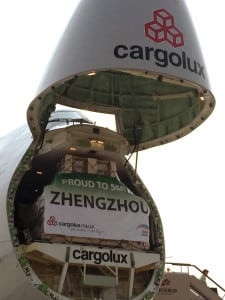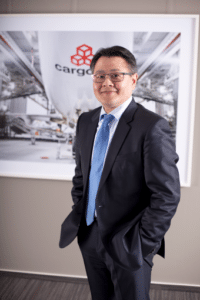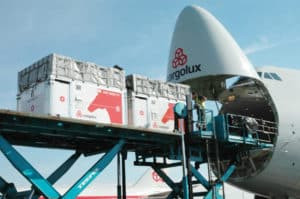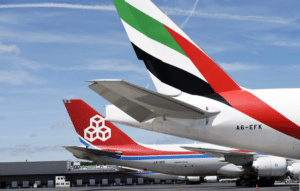The first six months of 2017 have been quite something at Cargolux Airlines International as it penned two significant agreements and looks to expand its business.
In May, the carrier signed a strategic operational partnership with Emirates SkyCargo and last month took a 25 per cent stake in new freighter carrier Henan Cargo Airlines to be launched in China in the fourth quarter of 2018.
2016 saw the Luxembourg-based airline’s scheduled freight tonne kilometres grow 10 per cent with available tonne kilometres increasing to 11.3 million and it carried 964,131 tonnes. On the cash side, net profits fell from $49 million in 2015 to $5.5 million in 2016.
Speaking at air cargo europe last month, Cargolux president and chief executive officer, Richard Forson (pictured) hails the agreement with Emirates, who he says it has always had a strong relationship with.
“We have always had a relationship with Emirates and then it slowed down a bit and at the end of last year the two parties got together and said we can do something really innovate in the industry,” Forson explains.
As part of the agreement Emirates will utilise capacity on Cargolux’s Boeing 747 Freighter aircraft while both will also further develop block space and interline agreements for use on each other’s networks.
Part of the agreement has seen Emirates start a B777F service from Dubai World Central (DWC) to Luxembourg Airport on 12 June with cargo being handled at the same facility in Luxembourg and in DWC. Cargolux will also increase its frequency of freighters to DWC from three times a week to five in July.
Forson says: “We said an operational partnership makes sense giving them access to B747F capacity and I think we can be more flexible than others and offer them products suitable for their needs.
“From our perspective we also get access to other destinations we don’t fly to at this stage, but we can now get on the bellies of Emirates to service our customers. We see it is a truly win-win exercise for both parties and there is obviously a lot more to be done as we develop this relationship as we go forward. I am very happy that I have Emirates as a partner.”
The big win it seems for Cargolux is access to the massive belly capacity of Emirates, giving it the opportunity to offer customers a wider range of destinations to fly cargo to.
Forson says: “Through their belly capacity I can really get a reach I would never have done. I am sure there have been many instances where we have not been able to move cargo to certain destinations, as there is no way economically we could do it.
“The B747F is a big aircraft and you need to fly a lot of cargo, but through Emirates and ourselves we can now offer many solutions for a lot of different customers.”
China is one trade lane Emirates will benefit on as Cargolux has a hub in Zhengzhou. “We have quite a big footprint in China now through our Zhengzhou hub and there is also the Chinese joint venture airline in China, which will be starting up. This will provide additional destinations on the network,” Forson says.
Both carriers will continue to sell as Emirates and Cargolux maintaining their independence as there is no equity swap and the partnership is only for operational purposes, Forson says.
Forson explains: “You get more efficiencies and synergies and from a customer’s point of view – they might service on certain days and we might service on certain days, but now they will have more choice.
“We will develop that demand with Emirates. So all in all I think it is the first time a main deck carrier has entered into a partnership with a combination carrier.”
Air cargo has seen a number of carriers go into varying partnerships and the Cargolux and Emirates could well be a sign of the future in Forson’s view and somewhat of a blueprint.
Forson says: “There are many combination carriers I think in the future might not be investing in freighters – if you look at what is happening with Europe for example.
“Emirates has a freighter fleet, Etihad Airways has got their own freighter fleet and Qatar Airways does – how long they will continue that is open to question, but from my perspective I do expect more and more combination carriers to look at their freighters when they do their investment decisions on fleet renewals.
“Emirates I think is big enough to justify a freighter fleet but there are a lot of other airlines looking at whether it makes sense to have a freighter fleet.”

As for the future, Forson feels 10 years from now airfreight will look very different: “It will be very interesting to try and predict what this industry will look like. It will look quite different to how it does today.
“There are more virtual borders coming on to the table through technology and how they will disrupt the logistics chain will be interesting.”
Planning for the future is a big challenge for the likes of Cargolux, Forson says: “In terms of strategising what this industry will look like in the future – that is the challenge.
“If you look back to the passenger industry, who would have thought 20 years ago that travel agents would be out of the market, but things are a bit different in the freight industry as it is B2B and not B2C.”
Forson is clear on how Cargolux needs to be: “I want to become a lot more agile and flexible compared to what we are today and especially to better able to match supply and demand.”






